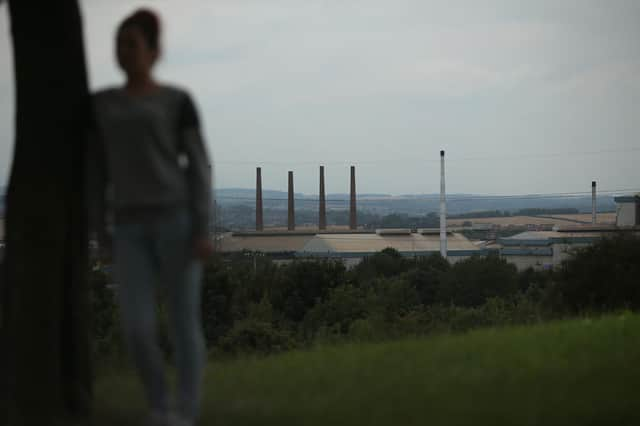Sexual abuse of women and girls and protection for male perpetrators will persist until gender equality is achieved – Susan Dalgety


“Sexual abuse was a daily reality,” she writes in her book, I Never Gave My Consent.
“My teenage years were punctuated by rape and beatings, as I was passed round paedophiles like a piece of meat.
Advertisement
Hide AdAdvertisement
Hide Ad“I believed them when they called me a slut and told me how worthless I was. I even believed I was a prostitute because they’d sometimes chuck me a few quid after they’d raped me.”
Society believed she was a prostitute too. In a report published this week into the sexual abuse of children in Telford, an independent inquiry found that, since the 1980s, up to 1,000 girls – including Holly – were victims of gangs of sexual predators.
Girls, carefully chosen for their vulnerability, were groomed into believing that they were in a consensual relationship with one man, only to find themselves raped by many others.
But instead of getting support from key agencies, such as social workers and the police, the girls were dismissed as prostitutes. And the report revealed that the grooming gangs – mostly Asian men – were left to carry out their campaign of abuse for fear of stoking racial tension if they were challenged. Girls like Holly were sacrificed for the sake of community cohesion.
Telford is just one of a long list of towns and cities across the UK where young, mostly working-class girls have been sexually exploited by grooming gangs.
The list shames us all: Newcastle, Rochdale, Rotherham, Oxford, Halifax, Keighley, Derby, Peterborough, Bristol, London, Huddersfield, Manchester, Oldham, Coventry, Middlesborough, Burton-on-Trent, Bradford, Birmingham, Nottingham, Hull, Newcastle, Yeovil, Sheffield, Aylesbury, Blackpool, Bolton, Leicester, Ipswich and Glasgow.
Two years ago, four men were jailed in Glasgow’s High Court for the rape and sexual exploitation of a 15-year-old girl. “A grave crime, from which all young girls and women should be protected,” said judge Lord Armstrong as he sentenced the men.
But the reality is that in the early decades of the 21st century, in one of the richest, most highly developed countries in the world, girls remain vulnerable, the risk of sexual assault a constant, daily fear for many.
Advertisement
Hide AdAdvertisement
Hide AdWithin hours of the publication of the report into the Telford grooming gangs, a BBC documentary made further allegations against DJ Tim Westwood, one of the most influential figures in modern music over the last 30 years.
In April, a joint investigation by the BBC and Guardian newspaper revealed several allegations of unwanted sexual behaviour by Westwood during his time at the BBC, often involving young women, all of them black.
In this week’s programme, Tim Westwood: Hip-Hop’s Open Secret, a woman said that Westwood first had sex with her when she was 14 years old, and he was in his 30s. He was “a predator”, she said. Another tells how Westwood, then in his 40s, began a “controlling relationship” with her when she was only 16.
Westwood denies all the allegations and BBC Director General Tim Davie, no doubt mindful of the Jimmy Saville scandal, said the claims would be investigated and a report published within two weeks.
The revelations kept coming. On Wednesday, the inquiry into child abuse in Scottish society published its findings into the psychology of child abusers.
In the report, the Catholic Church’s former safeguarding adviser, Martin Henry, claims that the church had put protecting its reputation before protecting children. “As an institution, there was this message: avoid bringing scandal on the church,” he said. The report went even further, saying that God had been “weaponised” to ensure the silence of children.
Therein lies the problem. Just as the grooming gangs of Telford and elsewhere were left alone to terrorise vulnerable girls for fear of triggering racial tension, so priests were left in peace to abuse young children for fear of damaging the church. And the BBC, mesmerised by Jimmy Saville’s fame and grateful for his viewing figures, enabled his reign of terror.
This week has been a terrible reminder of the power of the patriarchy. Our society, for all its government action plans, its public inquiries, its promises by politicians, remains stubbornly misogynist.
Advertisement
Hide AdAdvertisement
Hide AdThe belief that girls and women are lesser than boys and men is deeply embedded in our culture, from the pay gap between the sexes to attitudes towards sexual behaviour.
Women continue to be blamed for being sexually assaulted. “She was asking for it,” remains the refrain, even when the victim is a child.
Sexual violence has been normalised by the online porn that is freely available to every boy with a smartphone. Girls are pressurised into sharing naked images of themselves but remain silent when humiliated, for fear of being ostracised by their peers.
We may try to convince ourselves that we live in a non-binary world, but in 2022, her biological sex will shape a girl’s life as much as it ever did.
In its psychology report, Scotland’s child abuse inquiry found that “there is no definitive answer as to why the abuse happens”. Some abusers are “completely driven to do so and will design their lives accordingly,” it said, “while others act in response to opportunities presented to them”.
It goes on to say that rather than change the individual, the focus should be on changing the culture within an organisation. For organisation, read society, for as long as our society values females less than males, the sexual exploitation of women and girls will persist, and perpetrators will be protected.
A generation ago, women of my age dared to believe that we had won the battle of the sexes. The truth is it was only the start of the campaign.
